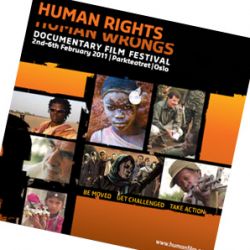When: Wednesday, 2. February 2011 Every day from around noon and until late
To: Sunday, 6. February 2011
Where: Oslo, Parkteatret
Host: Oslo Documentary Cinema and the Human Rights House Oslo
More info: www.humanfilm.no

Read the full programme of the festival here:
Read day by day programs here:
Wednesday 2 February
The festival opens with a bang on Wednesday 2 February with the first screening in Norway of the hard-hitting ‘Blood in the mobile,’ a film about the illegal and terribly dangerous coltane industry in the DR Congo. The Danish director Frank Poulsen will be present to introduce his own film, and answer questions after the screening. See the trailer for ‘Blood in the mobile’ here.
Watch more trailers for other films screnned at the HRHW documentary film festival here.
But even before the opening event, the festival gets underway with another premiere, the freshly made film ‘Muqdisho’ which takes its audience right into the violent chaos that the Somali capital has become. The film’s cinematographer Andre Liohn will be there to introduce his own film, and discuss with Jens Mjaugedal of the Norwegian Peace Building Center about what can be done in Somalia. Liohn is also this year’s festival photographer, with an exhibition in the nearby Galleri View of a selection of recent pictures of his, all taken in Somalia.
Also before the actual opening event comes the screening of the widely acclaimed ‘Reporter,’ which follows New York Times’ journalst Nicholas Kristof to the DrCongo, in search of individuals who by virtue of their own experiences can represent the entire conflict, and thus generate identification and empathy among the NY Times readership and beyond. In the film, Kristof reveals his simple, yet effective strategy as a human rights campaigner. The screening is followed by another discussion, this time between Profesor of Journalism Rune Ottosen, film maker Gry Winther, and cinematographer Andre Liohn.
On Thursday 3 February, long before the film festival programme begins, its main thematic focus, on persecution of sexual minorities, gets underway with two side events. First, from 8:15 to 10:00 in the morning, Gerald Sentongo, one of the festival’s guest’s, appears at the hugely popular weekly debate forum ‘Breakfast with Bernt’ at the Faculty of the Social Sciences at the University of Oslo. Gerald is a Ugandan sexual minorities’ rights’ activist. He will talk about life as a mamber of the LGBTI community in Uganda. The film ‘the Kuchus of Uganda’ will also be screened.
 At 11:30, the seminar ‘Persecuted for who you are: A lonely exodus’ takes place at the Norwegian Refugee Council. See an in-depth description in Norwegian here.
At 11:30, the seminar ‘Persecuted for who you are: A lonely exodus’ takes place at the Norwegian Refugee Council. See an in-depth description in Norwegian here.
Thursday’s festival theme is ‘Transitional Justice’. Naturally, the first film is on the ICC. The screening of ‘Prosecutor,’ a portrait of ICC’s chief prosecutor Luis Moreno-Ocampo is followed by a debate between Øystein Rolandsen and Andreas Motzfeldt Kravik, two of the leading experts in the field in Norway.
Later in the day, we screen ‘War Don Don’ and ‘Facing Genocide,’ the former following the trial against alleged Sierra Leonean war criminal Issa Sesay, the latter the trial of Khmer Rouge leader Khieu Sampran. Once again, we let the screenings be followed by an expert debate, this time between psychologist and human rights activist Nora Sveaass, currently Norwegian member of the UN Committee Against Torture and Theary Seng, a Cambodian lawyer, writer and human rights defender. Seng spent five months in a Khmer Rouge prison, and lost both her parents to her country’s former communist regime. Also on this panel is Gunnar Ekeløve-Slydal, Deputy Secretary General of the Norwegian Helsinki Committee. Finally, under the theme ‘Transitional Justice’, we screen ‘impunity,’ a film that gives unique insight into the attempts to bring justice to Colombia’s victims of the civil war.
For Friday 4 February, the theme is ‘Without Protection’. Sadly, many categories of particularly vulnerable victims of human rights violations ‘competed’ for inclusion here. For this year’s edition of HRHW, we decided to focus on children of war and conflict, and sexual minorities. Schools in and around Oslo will be invited for the program on children.
The screenings begin already at 10:00, with a short, animated documentary about child slavery in Sudan, simply called ‘Slaves,’ immediately followed by ‘Grace, Milly, Lucy … Child Soldiers,’


